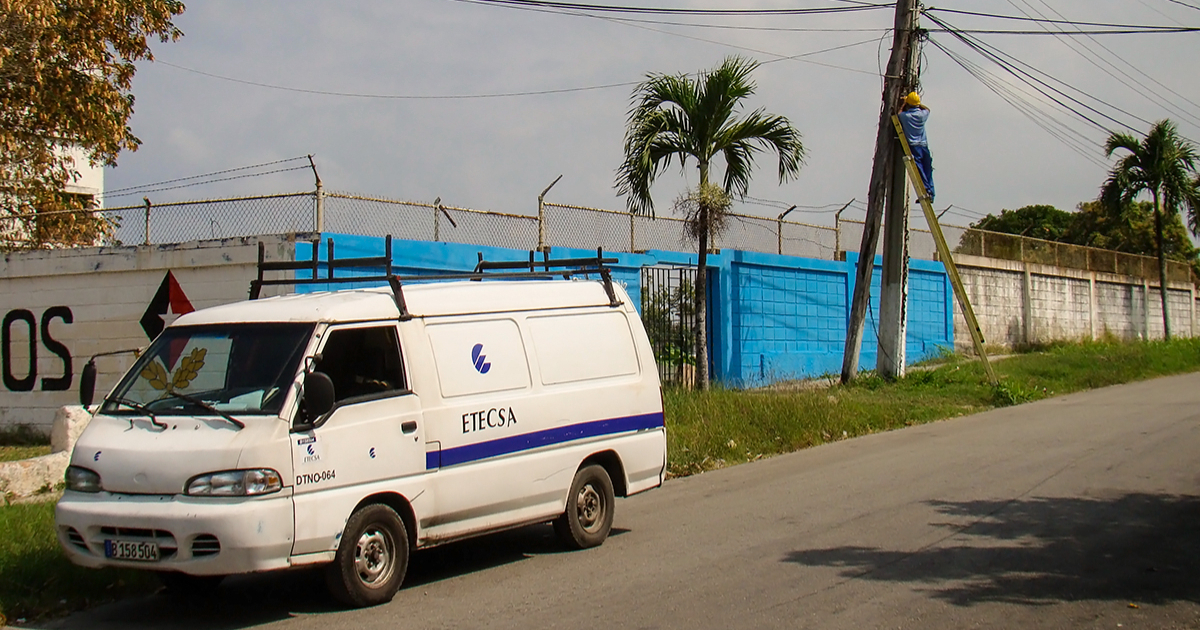
The Cuban Telecommunications Company S.A. (ETECSA) and the French company Orange S.A. They signed an agreement to bring internet to Cuba through an underwater cable that will connect it with Martinique.
“Agreement is signed with Orange S.A. for the installation of a submarine cable system that will allow our country, in accordance with economic possibilities, to continue expanding international connectivity,” indicated the state company that monopolizes telecommunications in Cuba.
In a statement, the company reported on the Arimao Project that will bring an international fiber optic submarine cable from the island of Martinique (overseas territory of France) to “expand the international connectivity” of Cuban Internet users.
Subordinated to the GAESA business conglomerate, controlled by the military caste of the Cuban regime, the state telecommunications company indicated that the agreement "will allow it to expand and diversify international capabilities in the face of the growing demand for internet connection and broadband services."
“The physical structure of the cable will be ready by 2023 and will provide the country with a new route for international services, geographically diversifying the current connectivity,” the company said without specifying dates for its launch.
According to the information offered by the Institutional Communication Directorate of ETECSA, “at this time the project is in development and has all the permits for its deployment.”
“Once [the project] becomes effective, the entities involved will expand the information,” indicated the Cuban company.
As described in its statement, the Arimao project “is a submarine cable system deployed by Orange, through its subsidiary Orange Marine, which will connect the Caribbean island of Martinique with the province of Cienfuegos, and whose capacity will allow ETECSA to support its international expansion.
“This will allow, in accordance with the country's economic possibilities, to continue expanding international connectivity in line with the development plan linked to the computerization of society,” concluded the company that offers and controls internet access in the country.
The Arimao project is made public after recently learning of the recommendation of the United States Department of Justice to the Federal Communications Commission (FCC), being against granting permission requested for the installation of the first underwater telecommunications cable that would directly connect US territory with Cuba, arguing "risks to national security" and "a counterintelligence threat."
ETECSA, a company with high rejection rates among Cuban users, has been denounced on countless occasions for massive internet cuts at times of protests by Cuban civil society or mobilizations called by activists.
The most recent of these occurred on November 26, when A massive internet outage affected more than 70% of network traffic in Cuba, during the early morning before the start of the People's Power municipal elections.
Reports from Cuba indicated that the blackout lasted throughout the early morning, starting at 5:00 UTC (local midnight), and that it extended until 11:30 UTC (6:30 a.m.).
Cubans have suffered massive internet outages since the historic protests of 11J, when the government decided to cut the service to avoid the traffic of information about the events. The population blamed the socialist state company for this arbitrariness.
From then on, these interruptions became a useful strategy in the face of each demonstration of dissatisfaction with the regime to avoid the domino effect of new protests.
For example, the latest Internet outages were preceded by the demonstrations that occurred in recent months in cities such as Holguín, Los Palacios, and Nuevitas. It is also common practice with activists and opponents, victims of this other form of censorship.
At the beginning of May, coinciding with the explosion at the Saratoga hotel and the increase in police deployment in the capital, Cuban users They reported impacts on the service and widespread internet blackouts in Cuba.
The cause of these cuts was the installation in the system of new repressive "filters and devices", introduced into the only telecommunications network in the country, since the 11J demonstrations, as they recognized CyberCuba an official and an employee of the company, who refused to be identified for fear of being fired.
The telecommunications company had a long history of participating in foreign investment until at the end of the 90s it paid 706 million dollars to the Italian TIM for 27% of its participation, making it a 100% Cuban capital company. reinforcing its monopolistic condition.
In turn, the company left the orbit of the Ministry of Communications and Electronics of Cuba and was located together with Banco Financiero Internacional, S.A. (BFI) on the platform of the military business conglomerate GAESA.
With eight million national and foreign clients, ETECSA holds a monopoly on telephone and communications services in Cuba, including profitable international telephone calls.
Orange S.A., initially known as General Directorate of Telecommunications and later as France Telecom, is a French multinational telecommunications company headquartered in Paris.
It provides global mobile telephony, fixed telephony, Internet, mobile Internet, and IP television services. It has 263 million customers globally and employs 100,000 people in France and 170,000 in the rest of the world. The company generated revenues of 40,236 million in 2015.
What do you think?
SEE COMMENTS (11)Filed in: